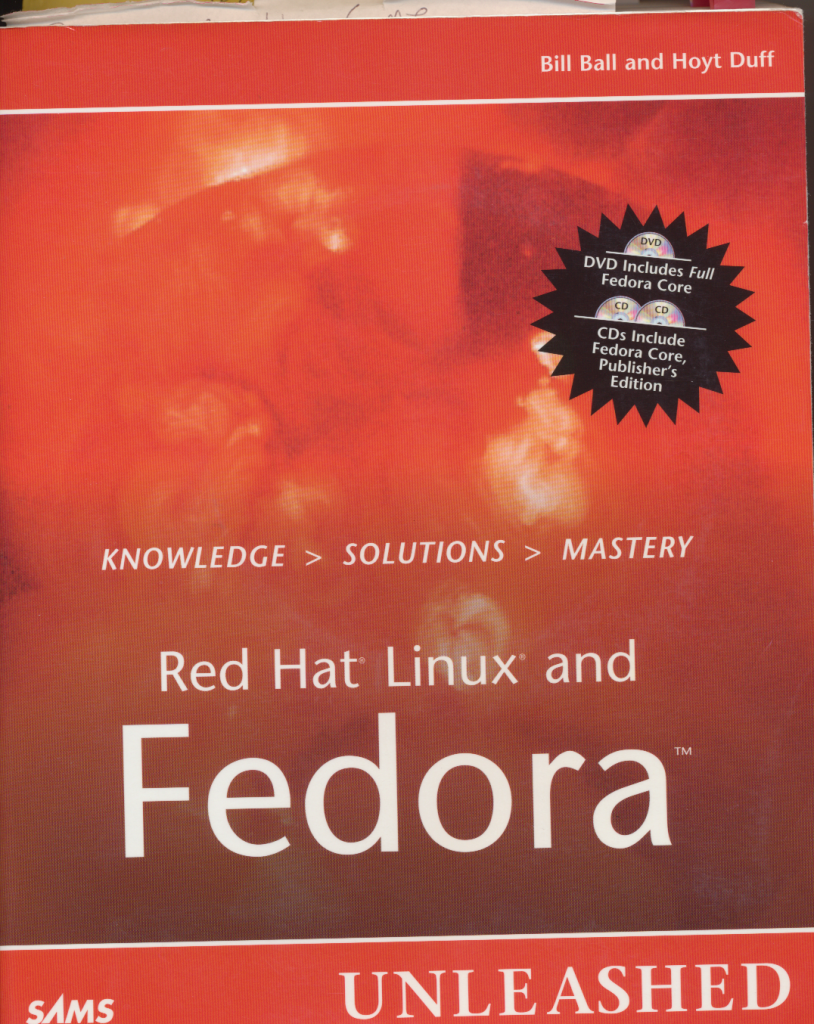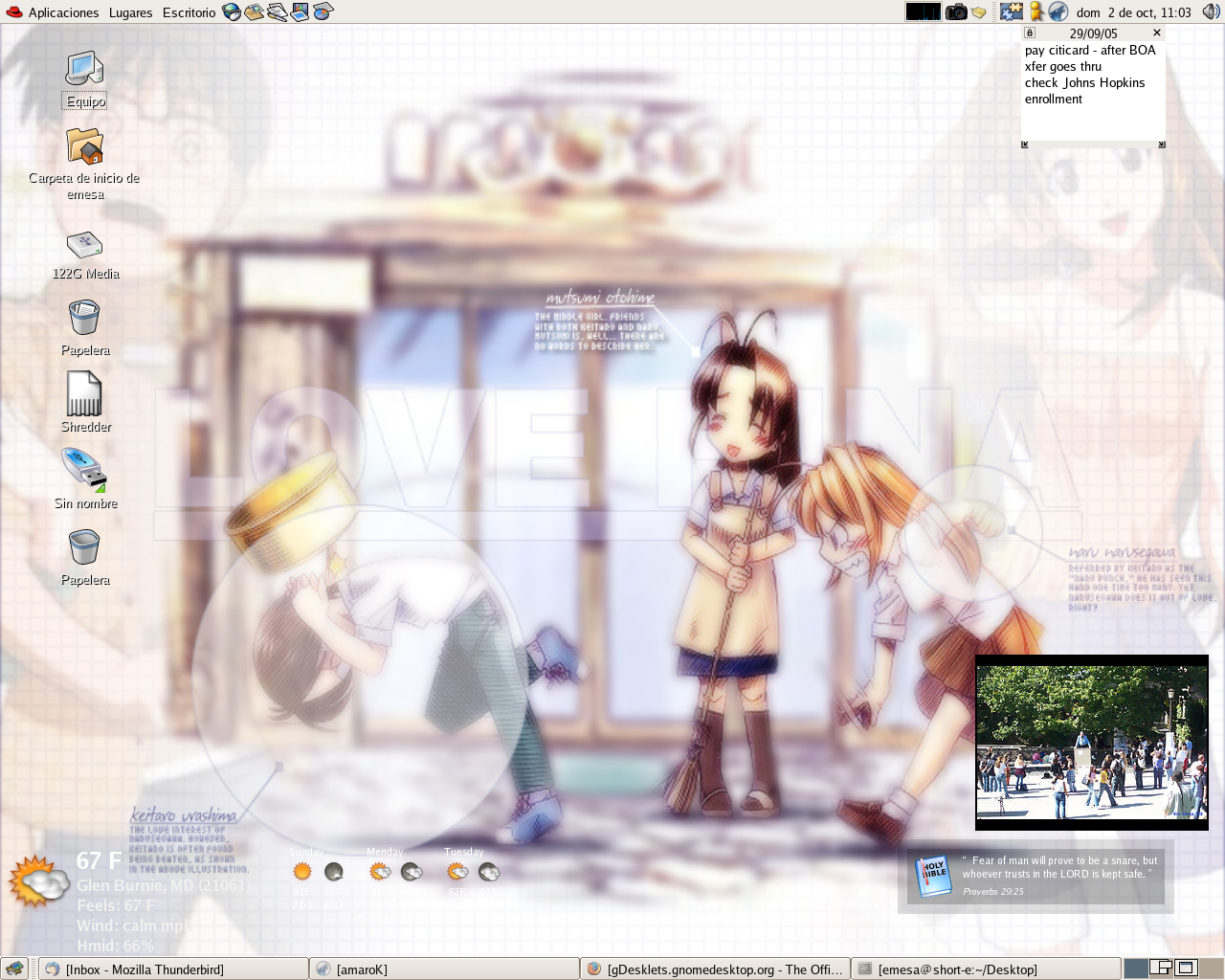Review: White Night
My rating: 5 of 5 stars
This is my favorite Dresden in a while. While it’s still tied up in the overarching story, this one is more of a return to a typical detective story. Murders abound and Harry has to find the killer. Like a proper detective book there a red herrings and bad conclusions as Harry and friends work to try and figure things out. In typical Dresden fashion, there’s an explosive climax (I won’t say if it’s literal or metaphorical).
Happy 20th Anniversary Fedora Linux and Happy Fedora 39 Release Day!
I can’t believe I’ve been using Linux for 20 years already! I started off with Fedora Core 1 (Yarrow) 20 years ago. It was in this book:
 Red Hat Linux and Fedora Unleashed Cover
Red Hat Linux and Fedora Unleashed Cover
Boy has the technology come a long way in those 20 years!
One of my earliest desktop screenshots from back then:
Now one of my more recent desktops:
Review: Threats: What Every Engineer Should Learn From Star Wars
Threats: What Every Engineer Should Learn From Star Wars by Adam Shostack
My rating: 3 of 5 stars
A reminder that I use the tooltips on GR and 3 stars is “I liked it”
This book doesn’t have nearly as much Star Wars as I was hoping for, but the Star Wars aspect still helps a lot. Let me illustrate what I was expecting and what I got. What I was expecting is for a book that would follow one or more Star Wars movies and discuss the security issues in each scene (if the scene had any); basically like the Star Wars and Philosophy books that the author mentions in the acknowledgments section. What Shostack does instead is use specific moments in Star Wars to illustrate concepts in a a book that reads like a more entertaining version of the CISSP certification study book. That is to say, it’s not dry, but it’s also WAY more technical than you might expect from the title itself. (Or the trailer for the book)
Late Oct - Early November Photojojo
It’s once again time for my latest Photojojo post. For those of you who haven’t been following my blog for a long time, Photojojo is a digital time capsule service. Every two weeks they send me an email that has my most interesting photos posted to flickr from one year ago.

Aladdin and Abu 2

Looking Outside

Monkey Hat

Scarlett 8 Month Portraits

Tissues
Review: SCIENCE: Ruining Everything Since 1543
SCIENCE: Ruining Everything Since 1543 by Zach Weinersmith
My rating: 4 of 5 stars
I’m a huge fan of Saturday Morning Breakfast Cereal, a nerdy web comic (like XKCD, but not stick figures). What elevates this book beyond a simple collection of science-themed SMBC strips is the ending where Weinersmith creates strips from personal anecdotes of various scientists (and a Mythbusters host).
Review: Proven Guilty
My rating: 4 of 5 stars
This book seemed to be more of a return to form in the sense that Harry has a lot of detective work to do here to figure out what’s going on. As usual, we have a bunch of seemingly disparate plots that come together in the end.
The series has explored ideas of faith quite a bit, especially when Michael is involved. This one spent a lot of time exploring it. I think Butcher has done a good job in the past, and continues to do a good job here, of finding ways to explain a world in which capital-G God exists and yet isn’t in direct opposition to the vampires and other horror creatures.
Review: Uncanny Magazine Issue 19: November/December 2017
Uncanny Magazine Issue 19: November/December 2017 by Lynne M. Thomas
My rating: 3 of 5 stars
“Making Us Monsters” (Sam J. Miller & Lara Elena Donnelly) - A story that takes place during WWI and the inter-war period. The main characters are gay and the story serves mostly to remind me of the horrible treatment given to Alan Turing. Turing was responsible for helping break the German code (along with a giant support staff - including lots of female “computers”) and was foundational in computer and information theory. But he was convicted of being gay and forced to endure punishment for that. The story was beautiful, but I found it to be a bit too long.
Review: Lost in the Moment and Found
Lost in the Moment and Found by Seanan McGuire
My rating: 4 of 5 stars
This is the hardest book to read of the entire series. There’s a content warning at the front of the book that explains why - but it is truly one of the cruelest. I think it’s also a book that needs to be ready by young adults and parents and anyone else who has to deal with the subject matter either as a victim or a potential helper.
Review: In Mercy, Rain
In Mercy, Rain by Seanan McGuire
My rating: 4 of 5 stars
I’m very much in favor of the way McGuire makes use of short stories within this series. They expand upon the stories from the main books without requiring those stories to be bogged down. In a sense, these are deleted scenes, except they’re meant to be canon. In taking a small chunk and expanding upon it, McGuire can slow things down and give us even more consideration or interiority of the characters.
Review: Where the Drowned Girls Go
Where the Drowned Girls Go by Seanan McGuire
My rating: 5 of 5 stars
I think this is the best book McGuire has yet written in the Wayward Children series. It’s a culmination of all that has come before and seems to be setting up something big for either book 9 or book 10. It’s clear that there are more complex rules to the doors and their effects on our world than had even been revealed in previous books.
